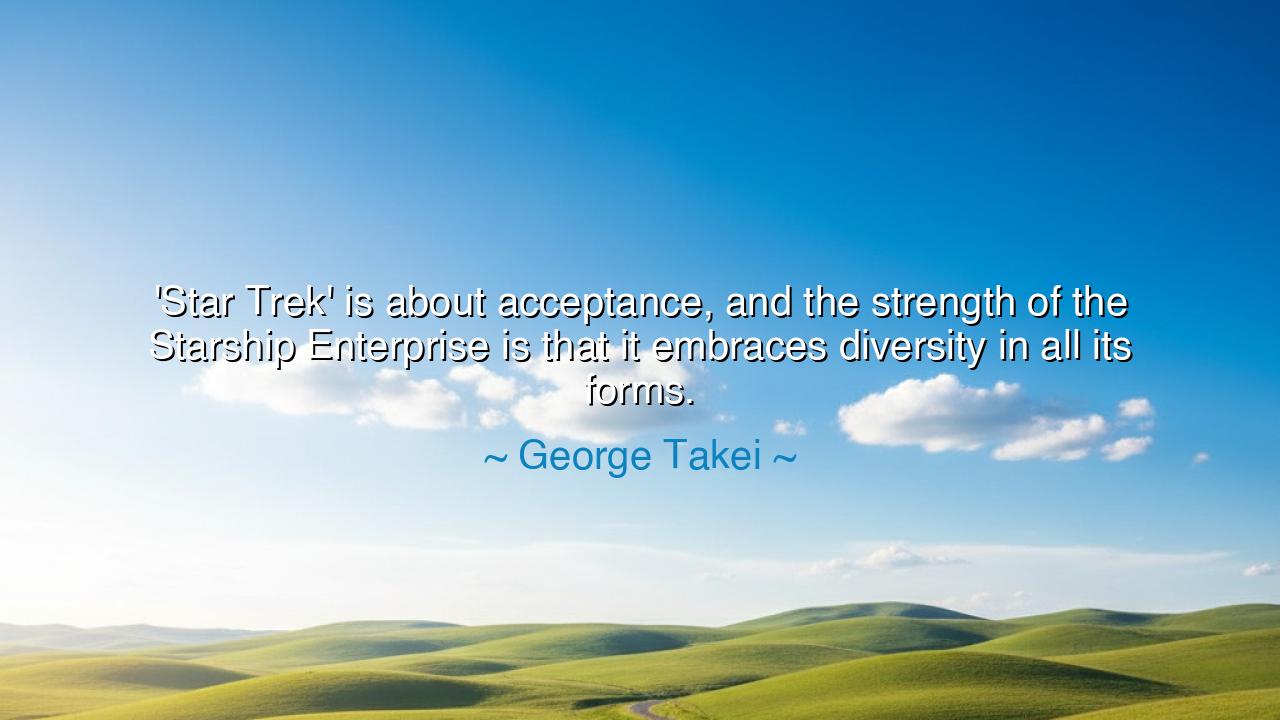
'Star Trek' is about acceptance, and the strength of the
'Star Trek' is about acceptance, and the strength of the Starship Enterprise is that it embraces diversity in all its forms.






George Takei, himself both actor and witness of history, once proclaimed: “‘Star Trek’ is about acceptance, and the strength of the Starship Enterprise is that it embraces diversity in all its forms.” In these words he unveils not merely the theme of a television tale, but a vision of humanity’s destiny. For in the voyages of a fictional ship lies a truth older than empires: that no people, no nation, no world can endure unless it learns to embrace difference, to make strength out of variety, and to walk together into the unknown as one.
The origin of this saying lies in the birth of Star Trek during the turbulent 1960s, when America was torn by struggles of race, war, and identity. Its creator, Gene Roddenberry, dreamed not of spaceships alone, but of a future where humankind had overcome its divisions. The Enterprise was not crewed by one people or one nation, but by many: men and women, black and white, Asian and Russian, even alien and human together. It was a bold defiance of the prejudices of its age, declaring that humanity’s future greatness lay not in sameness, but in unity through difference.
Takei himself embodied this truth. As a child, he endured the injustice of American internment camps for Japanese Americans during World War II. Yet years later, he stood on the bridge of the Enterprise, not as a caricature, but as Lieutenant Sulu, a capable and respected officer. His very presence on the show was a triumph of acceptance, a quiet rebellion against stereotypes. In this way, his words carry the weight not just of a story, but of lived experience—he knew the cost of exclusion, and the glory of inclusion.
History provides countless examples of what Takei teaches. The Roman Empire at its height was not strong merely because of its legions, but because it learned, for a time, to integrate the cultures of the peoples it conquered, allowing Gauls, Greeks, and Syrians alike to serve Rome. In contrast, nations that refused diversity, that clung to narrow bloodlines and shut out others, often crumbled under the weight of their own rigidity. The lesson of history is clear: strength lies not in uniformity, but in the harmony of many voices, many gifts, many peoples.
In the saga of Star Trek, the Enterprise sails not to conquer but to explore, to encounter the unknown with open hands rather than closed fists. Each crew member’s perspective—be it the logic of Spock, the passion of McCoy, the diplomacy of Uhura, or the daring of Kirk—adds to the ship’s resilience. Without this diversity, the vessel would falter. And so too in our lives: it is when we honor the voices of others, when we blend different strengths, that we discover solutions beyond what any single mind can imagine.
Takei’s words also offer a vision for our own age, where division and suspicion still threaten to tear communities apart. If the Enterprise could be imagined as a family bound not by sameness but by purpose, then so too can we build societies that do not fear difference, but cherish it as life’s great gift. Every community, every nation, is called to become such a starship—journeying into the future on the strength of its shared humanity.
So let this teaching endure: seek acceptance, embrace diversity, and recognize that true strength comes not from excluding others but from standing beside them. Let each of us build our own starship, in our homes, our workplaces, our nations—vessels that sail on the currents of unity, guided by the stars of compassion and justice. For as the Enterprise teaches, the greatest adventure is not only to discover new worlds, but to discover, in one another, the infinite possibilities of the human spirit.






AAdministratorAdministrator
Welcome, honored guests. Please leave a comment, we will respond soon